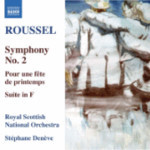
Roussel: Symphony No. 2 / Pour une fete de printemps / Suite in F major
 $25.00
Out of Stock
$25.00
Out of Stock6+ weeks add to cart
ALBERT ROUSSEL
Roussel: Symphony No. 2 / Pour une fete de printemps / Suite in F major
Royal Scottish National Orchestra, Stephane Deneve
[ Naxos / CD ]
Release Date: Friday 30 May 2008
This item is currently out of stock. It may take 6 or more weeks to obtain from when you place your order as this is a specialist product.
"Naxos' engineering is the most natural of all in terms of balance and perspective. Crank it up and wallow in some of the most marvelous symphonic music yet composed in France."
-- ClassicsToday, April 29, 2008 (10/10)
"All three works on the disc receive superb performances and the recorded sound is also very good. If you don't know these pieces, this is a most economical way to experience them. I can highly recommend this CD to anyone interested in Roussel or twentieth-century French orchestral music regardless of price."
(MusicWeb Bargain of the Month July 2008)
"Naxos' engineering is the most natural of all in terms of balance and perspective. Crank it up and wallow in some of the most marvelous symphonic music yet composed in France."
(10/10 ClassicsToday April 2009)
"Has anyone ever noticed that William Walton lifted the climaxes of the first movement of his Partita for Orchestra bodily from the Prélude of Roussel's Suite in F? Granted, they aren't the two best-known pieces in the world, but the comparison really is striking. Like so much of Roussel's music, this marvelous work's neglect is a total mystery: it's an unalloyed delight that, at a scant quarter-hour, would make a perfect concert opener placed before a big concerto. The tone poem Pour une fête de printemps, title notwithstanding, is darker, very much in the same style as the exactly contemporaneous Second Symphony, though it brightens up toward the end.
This brings us to the symphony, one of the shattering masterpieces of the 20th century literature and certainly the finest piece to come out of D'Indy's Schola Cantorum group of composers. There's no way it will ever be as popular as it deserves to be. Its gloomy opening, with its shadowy string textures, foreshadows late Shostakovich, and despite having some instantly memorable tunes and one of the most glorious scherzos in the entire universe for a central movement, the work commits the ultimate sin of ending quietly. Given its emotional and technical complexity, that's the kiss of death as far as programming is concerned.
Hot on the heels of Eschenbach's recent, excellent version, Stéphane Denève adds further laurels to his splendid Roussel cycle with this equally fine performance. While adopting very similar tempos throughout, he manages an interpretation that's quite different in character from Eschenbach's: lighter in texture (partly a function of the RSNO's bright basic timbre), and above all sharper in rhythm. You can hear this at the very outset, in the way Denève keeps up the Morse code-like motive (initially in the bassoons) right through the introduction. No one quite matches Martinon in the central scherzo, but this version comes very, very close, and in particular Denève, like Eschenbach, doesn't fall into the trap of playing the movement too quickly. And as always the RNSO horn section, so critical in the first and last movements, sounds glorious. Naxos' engineering is the most natural of all in terms of balance and perspective. Crank it up and wallow in some of the most marvelous symphonic music yet composed in France."
-- ClassicsToday, April 29, 2008 (10/10)
Tracks:
Symphony No. 2 in B flat major, Op. 23
Pour une fete de printemps, Op. 22
Suite in F major, Op. 33

